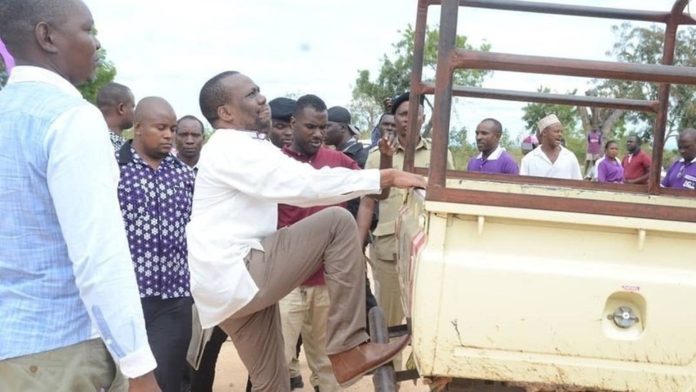Dar es Salaam, June 24 — A prominent Tanzanian opposition leader, Zitto Kabwe, and seven members of his party have been arrested after the police accused them of holding unlawful political meeting, in what appears to be on-going repression of political activities ahead of the October general elections, his party said.
Kabwe and his colleagues spent a night in police custody and were being quizzed for organizing and taking part in “unlawful” assembly, during the party’s internal meeting in Kilwa District, Lindi Region south of Tanzania.
Dorothy, Semu, vice-chair of the Wazalendo Alliance for Change and Transparency (ACT Wazalendo) — a fast-growing opposition party in Tanzania described the arrests as an act of “repression” and attempted “intimidation.”
“This is yet another naked attempt by the…government to intimidate and remove electoral competition, they are clearly quite fearful of,” she said in a statement.
The latest arrests come barely weeks after the leader of Tanzania’s main opposition party-CHADEMA, Freeman Mbowe, was assaulted by unknown assailants at his home in the capital city Dodoma.
President John Magufuli, who has launched his re-election bid for a second and final term, is widely perceived as an authoritarian leader.
Since he took office in November 2015, the state has enacted and enforced a number of repressive laws, thus bringing a chilling effect on the rights to freedom of expression, association, and peaceful assembly, campaigners said.
In July 2016 the country’s civic space rapidly shrunk after the president announced a blanket ban on political activities until 2020.
The ban, which lawyers said has no legal basis, had been selectively instituted to restrict political activities of the opposition.
A month ago, Kabwe was found guilty for sedition and incitement, after the court indicted him for falsely claiming that about 100 people had been killed at his home region in 2018 on clashes involving herders and the police.
He was, however, acquitted on condition that he stops making statements deemed seditious for one year.
“Today’s events are a clear example of the police being used by the CCM party to stop legitimate activities of the opposition party and file trumped-up charges against leaders and members,” Temu said.
She urged the police force to discharge its duties impartially in accordance with the law by focussing on its core mandate of protecting people and their property.
“We stand in solidarity with our leader and colleagues and will do everything in our power to secure their release and acquittal,” she stressed.
A fortnight ago, the ACT-Wazalendo’s party chairman, Seif Sharif Hamad accused the government of abusing the country’s law enforcement organs, in favor of the ruling Chama Cha Mapinduzi party, thus casting doubt whether the forthcoming polls will be free and fair.
“We now call for the charges to be dropped completely. The arrests were unlawful and an attempt to disrupt the legitimate actions of a political party,” he said.
The government denied the allegations.
Last year, Tanzania’s parliament amended the Political Parties Act, ushering in a wide-ranging restriction on the right to freedom of association and peaceful assembly.
The amendments, among others, give the government’s appointed registrar of political parties sweeping powers to deregister parties, demand information from political parties, and suspend party members.
It also introduces a requirement for organizations and individuals to get approval before conducting civic education.
Amnesty International—a global charity campaigning for human rights said the latest arrests of Kabwe and his colleagues is part of a vicious trend to silence opposition leaders and government critics.
“Coming barely three months before Tanzania goes to the polls, these arrests are a calculated move to harass and intimidate the opposition and critics ahead of elections, restrict their human rights and limit their campaigning,” said Seif Magango, Amnesty International’s Deputy Director for East Africa, the Horn and the Great Lakes.
The charity condemned Tanzania’s authorities for intimidating the opposition urging them to respect human rights.

